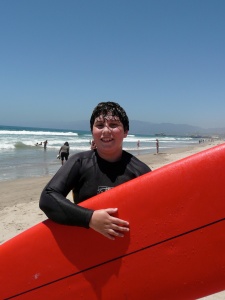 I am a terrible surfer. An absolute beginner as likely to be drinking seawater and getting thrashed as barely standing up, only to fall right down again. But I’m learning, alongside my twelve-year-old, who is already a better surfer than I, and who will only continue to out-pace me. And I’m having a great time being surf-buddies with my kid.
I am a terrible surfer. An absolute beginner as likely to be drinking seawater and getting thrashed as barely standing up, only to fall right down again. But I’m learning, alongside my twelve-year-old, who is already a better surfer than I, and who will only continue to out-pace me. And I’m having a great time being surf-buddies with my kid.
On a recent foray into the waves, I got hit in the face by my board, whacked on the head by its fins and trashed and tumbled in the rinse cycle. As I sat on my board on the sand, chest heaving for breath, I beheld my son emerge from a ridge of water—riding a wave! It wasn’t just and up and down, he really rode that wave, cut a turn and elegantly slid off at the end. He caught my eye, beaming and waved as I hoisted an equally beaming thumbs-up.
And there it was, the peak moment of the day was not any sort of personal triumph, but the pure joy of witnessing of my kid’s triumph. This is mirroring 101: be there to watch; it bestows Zen mindfulness upon us parents while facilitating our kids’ pride and belief in themselves. A tree falling in the forest does make noise, I’m pretty sure; but a kid mastering a skateboard trick or hitting a home run is just not the same if no one is there to see it.
I love the warmth of the car after the beach, and the sand everywhere. I love eating tacos with my kid at Holy Guacamole and feeling like we earned our carbs. And it all got me thinking about how doing things at which we suck, to use the vernacular, is a great way to help our kids grow. Firstly, it deepens our empathy, as we are frequently asking our kids to do all manner of things that we may have already mastered (i.e. math, grammar, responsibilities, etc.) and it’s good to drink deeply from the cup of “I don’t know what I’m doing.”
Despite the old-school ideas, from Oedipus to The Great Santini, that fathers and sons are locked in mortal combat, it’s good for kids to see that they can be better than us at things and that they have full permission to outshine us (I’ve vexed more than one coach over the years by saying “ridiculous” things like, “It’s all about fun, right?”). If that doesn’t go down easy, you might like to give some thought to themes of competition, self-esteem and your relationships with your own parents (i.e. did they compete with you? Was the unspoken, or spoken, message in the house that they had to be the best?).
Sucking at things while representing the ethic that we are willing to try, to fail, to try again—and being a good sport about not being skilled or gifted at things—helps teach self-esteem because it models taking chances and making small progress, rather than demanding perfection from ourselves or else not bothering to engage.
Perhaps today is a good day to do something at which we have no aptitude. An art project for one who never draws, or a sports activity for the dedicated couch-potato, might be just the ticket to lift a kid’s spirits—especially if it’s something they enjoy or are even moderately skilled at. So here’s to sucking at things with a good attitude, and to not taking ourselves too seriously… in the service of more fun lives, and in the service of all our children.
Namaste, Bruce



{ 3 comments… read them below or add one }
My then 8 year old son taught me to boogie-board. Two years later we’re still going strong even as he catches the much bigger waves as we give each a thumbs up. I came from a very competitive family were I rarely won (being the youngest and the age difference). When I did there was no graciousness. That is a cycle I don’t want to continue…thank you for your post.
Thank you for the reminder of asking our kids to do something that they may
not have a clue about. I find myself frequently doing just that. Here, all I can say is dah. I too was raised by a competitive parent, and am beginning to understand how it affected me.
peace and love to all
An awful lot of truth to this Bruce. I have recently taken up Tennis with my daughter (had never played before) but the time shared and learning together are great moments.